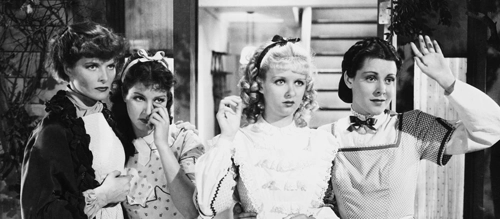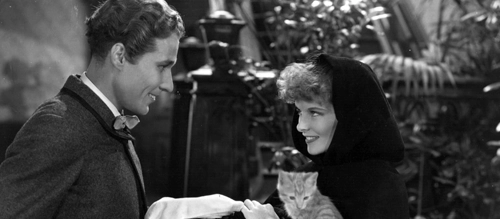Little Women (1933) Review

Little Women (1933)
Director: George Cukor
Screenwriters: Sarah Y. Mason, Victor Heerman
Starring: Katharine Hepburn, Joan Bennett, Paul Lukas, Edna May Oliver, Douglass Montgomery, Jean Parker, Frances Dee
“Little Women” by Louisa May Alcott, first published in two volumes in 1868 and 1869, has been adapted for the screen seven times over the last 100 years. In 1933, following two silent films in 1917 and 1918, George Cukor, who would later go on to direct such classics as The Philadelphia Story, Gaslight, and 1954’s A Star is Born, directed the first sound adaptation starring Katharine Hepburn. Cukor’s overly sentimental version of the novel was just what Depression-era audiences needed during a period marked by uncertainty and poverty. The film was a critical hit as well, and was nominated for three Academy Awards, winning Best Adapted Screenplay. Hinging on Hepburn’s superb performance, Little Women takes Alcott’s novel about four sisters coming of age during and after the American Civil War and remakes it for a Depression-era audience nostalgic for family values and desperate to relive a simpler time.
Little Women follows the March sisters – Jo (Katherine Hepburn), Amy (Joan Bennett), Meg (Frances Dee) and Beth (Jean Parker) – as they make the transition from adolescence to adulthood, against the backdrop of the Civil War. With their father away fighting for the North, the March sisters do their best to help their Mother (Spring Byington), who they affectionally call Marmee, keep the house in order. They all have their own hopes and dreams: Amy wants to become a famous painter, Meg longs to find love and marry, Beth yearns to stay right where she is and play her piano, and Jo dreams of traveling and writing great tales of romance and adventure. Together, they experience first love, marriage, and eventually tragedy.
All of the screen adaptations of “Little Women” offer a window into the time they were made. Gillian Armstrong’s 1994 adaptation, for instance, put a strong emphasis on Jo’s writing and her search her independence during a time when women weren’t really allowed to be much more than wives and mothers. Greta Gerwig’s Little Women deconstructed the narrative, commenting on the very act of telling stories and how they help us to immortalize those we love. 1933’s Little Women is interesting because it doesn’t deconstruct the story as much as it twists it to fit the ideals of a country ravaged by The Great Depression, which began in 1929 and eventually affected the global economy. It threatened jobs and livelihoods, and it forced people out onto the streets. Because of this, Little Women is dripping with sweetness, with Cukor putting a strong emphasis on family values and domesticity. The Civil War is nothing more than a set piece, rarely mentioned in great detail, so that the March sisters’ trials and tribulations can be a stand in for the struggles of those living through current times.
It is also worth mentioning that the film was made only a year before the Hays Code began to be strictly enforced. Several Hollywood scandals, including the rape and murder of a Virginia Rapp by silent film actor Roscoe “Fatty” Arbuckle and the still unsolved murder of director William Desmond Taylor, as well as the increasing moral panic over sexually suggestive themes in movies, led to the creation of the code in 1930 by studios desperate to get various religious groups and the government off its back. Given how tame and conservative it is, it’s not hard to see how Little Women might have been a breath of fresh air for certain audiences.
The script is pretty sparse and it speeds through plot points breezily, never stopping to really consider the consequences of any of them. There aren’t really any consquences in the film at all, just things that happen and then we quickly move on. The film doesn’t dwell on unpleaseantness very long, or at all, even when there is a major death towards the end of the film. Because of this, the March sisters – save for Jo – are all interchangeable and never really get a chance to shine on their own. Meg’s courtship and eventual marriage to Laurie’s (Douglass Montgomery) tutor Mr. Brooks (John Lodge) is sidelined, and Amy’s trip to Europe and her marriage to Laurie happen almost completely off screen.

The only character that truly gets the spotlight is Jo and it’s hard to complain when she’s being played by Katharine Hepburn, whose own outspokenness and firery personality mirror that of Jo’s. One can’t help but to think of Hepburn’s own defiance of Hollywood and society at large when she’s playing Jo, particularly her habit of wearing trousers before it was “okay” for women to do so. But modern audiences might be taken aback by Hepburn’s portrayal of Jo because she doesn’t resemble the version of Jo seen in later adaptations. Both Winona Ryder and Saoirse Ronan, who played Jo in the 1994 version and the 2019 version, respectively, exhibit a kind of passion and wit that just isn’t in Hepburn’s portrayal. Because these versions go to great lengths to showcase Jo’s stubbornness and her anger, her refusal to conform to society’s expectations, they make Hepburn’s Jo feel watered down, her fire extinguished. Even Hepburn’s own voice, so distinctive and loud, is softer and meeker in Little Women.
This is, of course, not Hepburn’s fault. The story doesn’t allow for her to really let go, to emotionally revel in any kind of emotion that isn’t happy and grateful and content. Meg is going to marry Mr. Brooks? That’s inconvient, but it turns out fine. Amy is going to Europe with Aunt March instead of Jo? That’s fine too, afterall, Amy deserves it more. Beth dies? Well, it’s sad, but she’s looking down on them and smiling from heaven, so that’s fine too. Every time Jo encounters an obstactle, a moment that should move the story along and change her in some way, she simply accepts what’s happening without much care. The movie seems to be saying, very loudly, everything is okay. It’s fine. It’ll be fine.
Little Women may not strike at the hearts of modern audiences the way it did with audiences during the turmoil of the 1930s. It may feel too simple, too clean. Too okay. For those who desire conflict and darkness and pain, this movie offers none of that. But for others, those who may need an umbrella during a sun shower, or a hand to hold when theirs is empty, 1933’s Little Women might be exactly what they’ve been looking for.
Score: 20/24

